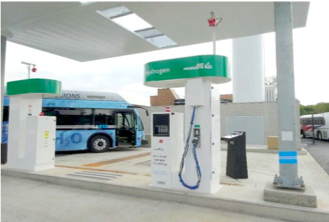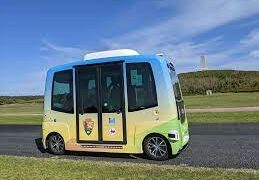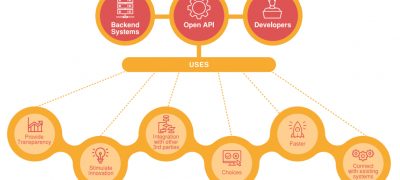Low-emission vehicles (LEV) produce fewer emissions than the average internal combustion engine vehicle, whereas zero-emission vehicles (ZEB) produce no tailpipe emissions. Low-emission vehicles include hybrid vehicles and those powered by compressed natural gas (CNG) and propane. ZEB vehicles are electric vehicles powered by hydrogen fuel cells or batteries. LEV and ZEB projects (vehicles and infrastructure) are both eligible for funding under the FTA 5339(c) Low or No Emission Vehicle (i.e., “Low-No”) Program
Low-No Vehicle Types
Fuel Cell
A fuel cell vehicle uses hydrogen fuel cells as its power source to convert the energy produced by the reaction between hydrogen and oxygen into usable energy that powers the motor (often called an electric drive train).
Battery-Electric
Battery-electric buses (BEB) are powered by an electric motor fueled by energy stored in a battery located on the vehicle.
Conventional Hybrid
Conventional diesel-electric hybrid vehicles have a diesel engine that recharges onboard batteries through regenerative braking to power an electric motor for at least a portion of the vehicle propulsion. This type of vehicle uses less fuel than that of a conventional engine, and is therefore considered low-emission.
Compressed Natural Gas (CNG)
CNG is methane stored at high pressure and used as fuel in traditional gas-powered engines, with fuel tanks stored on the roof of the vehicle.
Propane
Propane vehicle engines operate similar to that of diesel engines but are not widely used to power heavy-duty vehicles.
Questions to ask before choosing an alternative fuel
- What goal are you trying to achieve with deploying an alternative fuel?
- How many miles per day do I need the bus to travel?
- What size bus am I trying to replace?
- How often will my bus need to be charged/fueled? At what time of day? How long will it take?
- What is the availability of power infrastructure?
- What type of space constraints do I have at my facility?
- What facility upgrades will I need?
- Do we run the HVAC system a lot on vehicles?
- What type of climate and terrain do I operate in?
- Is there a fuel source nearby?
Pros and Cons of Alternative Fuels
| Technology | Pros | Cons |
| Conventional Hybrid |
|
|
| Fuel Cell |
|
|
| Battery-Electric |
|
|
| CNG |
|
|
| Propane |
|
|
If you’d like to view the PDF version of this factsheet, click here
Sources
Propane Education and Research Council. “A COMPARATIVE ANALYSIS OF GRENNHOUSE GAS EMISSIONS FROM PROPANE AND COMPETING ENERGY OPTIONS” (2014) https://nexightgroup.com/wp-content/uploads/2014/08/Comparative-Analysis-Of-GHG-Emissions-June-2014.pdf
U.S. Department of Energy. “Clean Cities Alternative Fuel Report” (July 2021) https://afdc.energy.gov/files/u/publication/alternative_fuel_price_report_july_2021.pdf
TCRP Research Report 219. “Guidebook for Deploying Zero-Emissions Transit Buses” (2021) https://www.nap.edu/catalog/25842/guidebook-for-deploying-zero-emission-transit-buses
Connecticut Center for Advanced Technology, “Fuel Cell Electric Buses: A business Case for Clean Transportation in Connecticut” (January 2018) http://chfcc.org/wp-content/uploads/2018/04/FCEB-Business-Case-1-23-18f.pdf
Carnegie Mellon University, Scott Institute for Energy innovation. “Which Alternative Fuel Technology is Best for Transit Buses?” (January 2017) https://www.cmu.edu/energy/education-outreach/public-outreach/17-104%20Policy%20Brief%20Buses_WEB.pdf
Greater New Haven Clean Cities Coalition. “How can I compare the energy content of alternative fuels and gasoline or diesel?” (April 2017) https://nhcleancities.org/2017/04/can-compare-energy-content-alternative-fuels-gasoline-diesel/
Tong, F. Et al. Transportation Research Part D: Transport and the Environment. “Life cycle ownership cost and environmental externality of alternative fuel options for Transit Buses” (Dec 2017) https://www.sciencedirect.com/science/article/abs/pii/S136192091630476X
National Renewable Energy Laboratory. “Fuel Cell Buses in U.S. Transit Fleets: Current Status 2017” (November 2017) https://www.nrel.gov/docs/fy18osti/70075.pdf
National Renewable Energy Laboratory. “AFLEET Tool 2020” (April 2021) https://greet.es.anl.gov/afleet_tool
Energy for Everyone Propane. “Propane Autogas Refueling Options”. Website accessed 5/31/2022 https://propane.com/for-my-business/fleet-vehicles/propane-autogas-refueling-options/#/find/nearest?fuel=LPG&lpg_secondary=true&country=US
NC Clean Energy Technology Center. “Financing Models: Propane Autogas Vehicles and Infrastructure” (June 2018) https://nccleantech.ncsu.edu/wp-content/uploads/2018/06/Propane-Finance-Models.pdf





